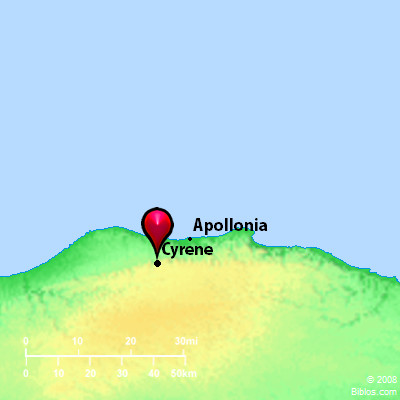Atlas  Cyrene and surrounding area
Maps Created using Biblemapper 3.0Additional data from OpenBible.info
You are free to use up to 50 Biblos coprighted maps (small or large) for your website or presentation. Please credit Biblos.com. Occurrences Matthew 27:32 As they came out, they found a man of Cyrene, Simon by name, and they compelled him to go with them, that he might carry his cross. Mark 15:21 They compelled one passing by, coming from the country, Simon of Cyrene, the father of Alexander and Rufus, to go with them, that he might bear his cross. Luke 23:26 When they led him away, they grabbed one Simon of Cyrene, coming from the country, and laid on him the cross, to carry it after Jesus. Acts 2:10 Phrygia, Pamphylia, Egypt, the parts of Libya around Cyrene, visitors from Rome, both Jews and proselytes, Acts 11:20 But there were some of them, men of Cyprus and Cyrene, who, when they had come to Antioch, spoke to the Hellenists, preaching the Lord Jesus. Acts 13:1 Now in the assembly that was at Antioch there were some prophets and teachers: Barnabas, Simeon who was called Niger, Lucius of Cyrene, Manaen the foster brother of Herod the tetrarch, and Saul. Encyclopedia CYRENEsi-re'-ne (Kurene "wall"):
1. Location:
Cyrene was a city of Libya in North Africa, lat. 32 degrees 40' North, long. 22 degrees 15' East. It lay West of ancient Egypt, from which it was separated by a portion of the Libyan desert, and occupied the territory now belonging to Barca and Tripoli. It was situated upon an elevated plateau about 2,000 ft. above the sea, from which it was distant some 10 miles. A high range of mountains lies to the South, about 90 miles inland. This shelters the coast land from the scorching heat of the Sahara. The range drops down toward the North in a series of terrace-like elevations, thus giving to the region a great variety of climate and vegetation. The soil is fertile.
2. History:
Cyrene was originally a Greek colony rounded by Battus in 630 B.C. Because of the fertility of the soil, the great variety in climate and vegetation, together with its commercial advantages in location, the city soon rose to great wealth and importance. Greater fame, however, came to it through its distinguished citizens. It was the home of Callimachus the poet, Carneacles the founder of the New Academy at Athens, and Eratosthenes the mathematician. To these must be added, from later times, the elegant ancient Christian writer Synesius. So important did this Greek colony become that, in little more than half a century, Amasis II of Egypt formed an alliance with Cyrene, marrying a Greek lady of noble, perhaps royal, birth (Herod. ii.181). Ptolemy III (Euergetes I), 231 B.C., incorporated Cyrene with Egypt. The city continued, though with much restlessness, a part of the Egyptian empire until Apion, the last of the Ptolemies, willed it to Rome. It henceforth belonged to a Roman province.
In the middle of the 7th century, the conquering Saracens took possession of Cyrene, and from that time to this it has been the habitation of wandering tribes of Arabs.
3. Biblical Importance:
Cyrene comes into importance in Biblical history through the dispersion of the Jews. Ptolemy I, son of Lagus, transported Jews to this and other cities of Libya (Josephus, CAp, II, 4) and from this time on Jews were very numerous there. By the return of the Jews of the Dispersion to the feasts at Jerusalem, Cyrenians came to have a conspicuous place in the New Testament history. "A man of Cyrene, Simon by name," was caught by the Roman soldiers and compelled to bear the cross of Jesus (Matthew 27:32; compare Mark 15:21 Luke 23:26). See CYRENIAN. Jews from Cyrene were among those present on the day of Pentecost. Their city appears as one of the important points in the wide circle of the Dispersion described by Peter in his sermon on that occasion (Acts 2:10). Cyrenian Jews were of sufficient importance in those days to have their name associated with a synagogue at Jerusalem (Acts 6:9). And when the persecution arose about Stephen, some of these Jews of Cyrene who had been converted at Jerusalem, were scattered abroad and came with others to Antioch and preached the word "unto the Jews only" (Acts 11:19, 20 the King James Version), and one of them, Lucius, became a prophet in the early church there. In this case, as in so many others, the wise providence of God in the dispersion of the Jews in preparation for the spread of the gospel of the Messiah is seen.
4. Archaeology:
In the ruins of Cyrene are to be seen the remains of some beautiful buildings, and a few sculptures have been removed. The most interesting remains of the wondrous civilization of this Greek colony are in a great system of tombs, some built, but the finest cut in the solid rock of the cliff. Doric architecture and brilliant decorative painting adorn these tombs.
LITERATURE
Herodotus ii; Josephus, Apion; Thrige, Res Cyrenensium.
M. G. Kyle
CYRE'NE, the capital of a small province, and formerly the chief city of Libya in northern Africa, in the region now called Barca on the e. of Tripoli. It is now desolate, on a plateau 1800 ft. above the sea and 400 ms. a little n. of w. of Jerusalem. Strong's Greek G2956: Kurnaiosof Cyrene |




